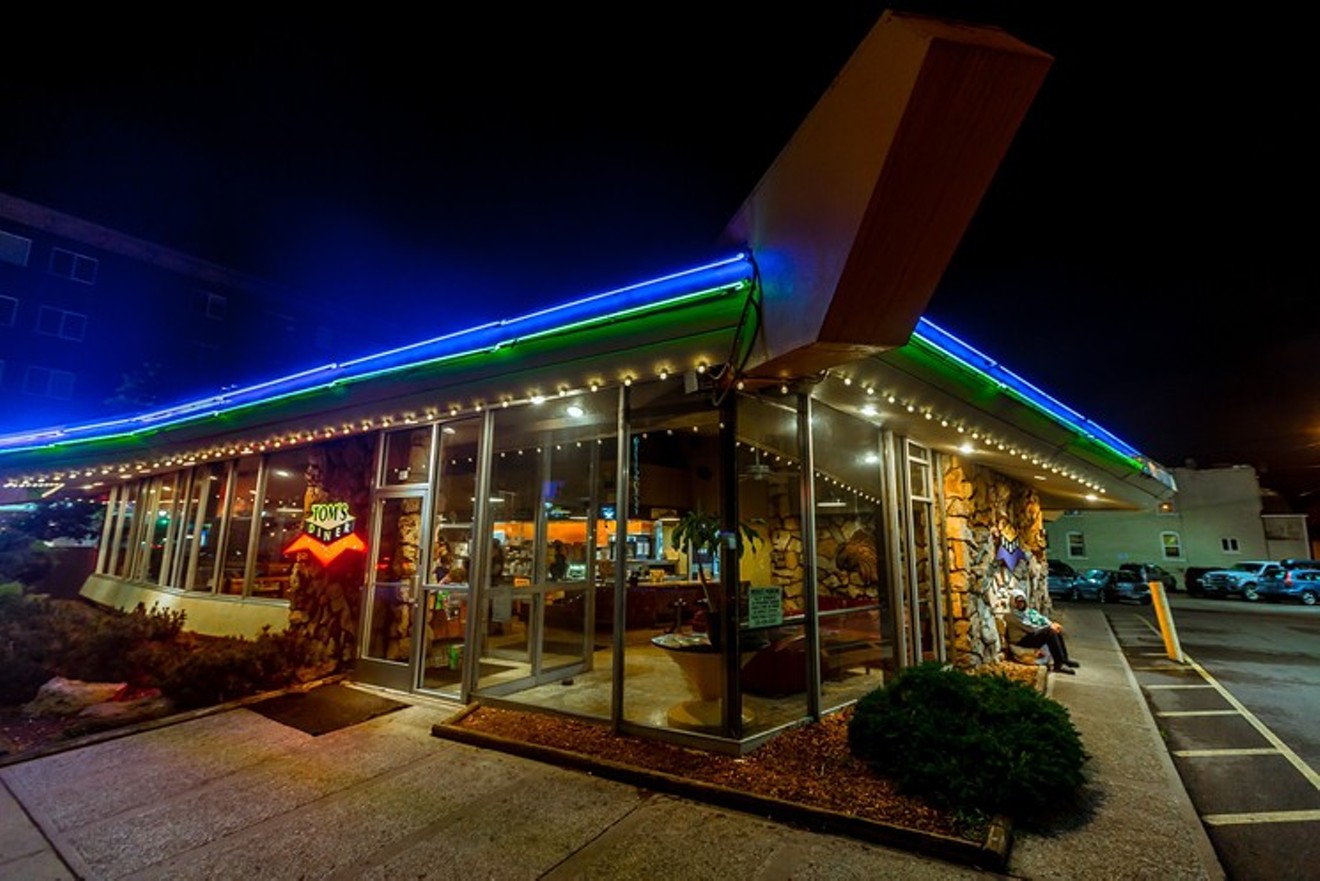Three years ago, Tom Messina thought he was set for retirement: He had a deal to sell Tom's Diner to a developer, who'd just posted a notice of an application to get a certificate of non-historic status for the property, which would allow the building to be demolished.
But then five Denver residents applied to have Tom's Diner declared historic, citing the classic Googie architecture of the longtime Colfax Avenue landmark.
Messina won the fight, but not before the city became embroiled in a debate over who has the right to determine that a building must be preserved.
"There are people in Denver who feel like there should be a higher bar for owner-opposed designations, and the reason they think that is because there have been people who have tried to designate other people's property as a way to stop development," says Councilmember Kendra Black.
During a July 19 Denver City Council Land Use, Transportation and Infrastructure Committee meeting, Black, along with colleagues Amanda Sawyer and Kevin Flynn, pitched a proposal that would allow a property owner to present a case during any public hearing before council on a landmark designation.
"We wanted to give [the property owner] the opportunity to actually present, and when we came up with that idea, both CPD and Historic Denver said, 'That's fine,' but they also want to give the applicant an opportunity to present," Black says.
CPD has received between five and eight landmark applications every year since 2010. Eighteen of those applications have been owner-opposed. However, just one of those owner-opposed applications —for Beth Eden Church, at 3241 Lowell Boulevard, in 2014 — received majority support from Denver City Council. While the actual church is gone, the structure remains intact as part of a mixed-use development.
Applying for a landmark designation is fairly easy. A property owner can apply for just a $250 fee. Three people who are Denver residents, property owners or business owners can apply to designate any building a landmark after paying an $875 fee. The executive director of CPD or any Denver City Council member can also apply for a landmark designation for a property.
After CPD studies the application, it goes to the Denver Landmark Commission, If the commission determines that the property is worthy, the final arbiter is Denver City Council.
Ultimately, council decided not to grant Tom's Diner historic status. But the story didn't end there: The situation was ultimately resolved when Historic Denver found a history-friendly developer, GBX Group, that promised to maintain the Googie structure while renovating it and building a development around it. Messina is now working with GBX to transform Tom's Diner, which shut down at the beginning of the pandemic and hasn't reopened, into Tom's Starlight, a new restaurant without the 24/7 component.
The proposal pushed by Black, Sawyer and Flynn, which the committee approved sending to the full Denver City Council, also sets a new framework for testimony in historic district designation applications — which involved whole areas, not just a single property — before council. Under the proposal, every applicant and property owner would get three minutes to speak, and those individuals could cede their time to others. If there were ten people applying for the district designation, for example, they could each cede their three minutes to a professional consultant, who could then speak for a half hour.
Black says that she and her two colleagues had considered creating an even higher hurdle for owner-opposed landmark applications to be approved by council.
"One idea would be that you'd need a supermajority for an owner-opposed designation. You'd need ten votes instead of seven," Black says, adding that another idea "is that you take away that ability for anyone and instead a councilperson could do that. I actually really like that idea, because if it's legit, a councilperson will do it. But if it's somebody being a NIMBY, I think that the councilperson wouldn't do it."
But the three didn't find enough support for those ideas from other councilmembers. So they ended up settling on this compromise.
"It's not major, but if it's your property, you would be happy that now you have an opportunity to present," Black says. "It levels the playing field a little bit for them."
[
{
"name": "Air - MediumRectangle - Inline Content - Mobile Display Size",
"component": "12017618",
"insertPoint": "2",
"requiredCountToDisplay": "2"
},{
"name": "Editor Picks",
"component": "17242653",
"insertPoint": "4",
"requiredCountToDisplay": "1"
},{
"name": "Inline Links",
"component": "18838239",
"insertPoint": "8th",
"startingPoint": 8,
"requiredCountToDisplay": "7",
"maxInsertions": 25
},{
"name": "Air - MediumRectangle - Combo - Inline Content",
"component": "17261320",
"insertPoint": "8th",
"startingPoint": 8,
"requiredCountToDisplay": "7",
"maxInsertions": 25
},{
"name": "Inline Links",
"component": "18838239",
"insertPoint": "8th",
"startingPoint": 12,
"requiredCountToDisplay": "11",
"maxInsertions": 25
},{
"name": "Air - Leaderboard Tower - Combo - Inline Content",
"component": "17261321",
"insertPoint": "8th",
"startingPoint": 12,
"requiredCountToDisplay": "11",
"maxInsertions": 25
}
]












